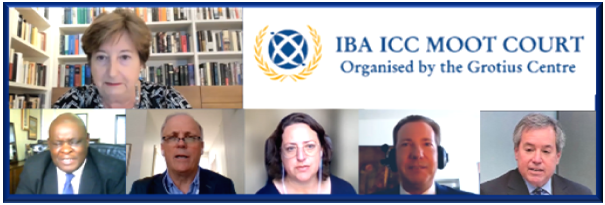Podcast: The Ukraine refugee crisis
Russia’s invasion of Ukraine, which began on 24 February, has resulted in the displacement of millions of Ukrainians. The responses taken by governments around the world – such as the activation of the Temporary Protection Directive by the EU – and the challenges being faced have prompted questions around how best to assist displaced people, while the situation has also highlighted the continuing plight of refugees from Afghanistan and other crisis zones.
This Global Insight podcast explores the unprecedented reaction to the plight of Ukrainian refugees and the need for a coordinated, compassionate international response, and assesses the situation for displaced people from other conflict zones, such as Afghanistan. Discussing these issues are:
- Matt Saltmarsh, Head of News and Media for the UN’s refugee agency, UNHCR;
- Greg Siskind, Vice-Chair of the IBA Immigration and Nationality Law Committee and a founding partner at Siskind Susser in Memphis; and
- Alex Stojicevic, Refugee Officer of the IBA Immigration and Nationality Law Committee and founding and managing partner of MKS Lawyers in Vancouver.
Accountability for mass atrocities report launched
The IBA has collaborated with the University of Oxford’s Institute for Ethics, Law and Armed Conflict and the Simon-Skjodt Center for the Prevention of Genocide of the United States Holocaust Memorial Museum to launch a new report: Anchoring Accountability for Mass Atrocities: The Permanent Support Needed to Fulfil UN Investigative Mandates.
From Syria to South Sudan, and most recently Ukraine, UN investigative mandates both establish the truth by gathering evidence of potential international atrocity crimes, and help lay the foundations for future accountability. The report is the result of a two-year study and presents two potential models that could be used to both build and better support the UN’s investigative capacity. The study reveals that much can be learned from the three UN independent investigative mechanisms, and that effectively and efficiently supporting accountability moving forward requires seizing on the lessons learned and investment made to build permanent investigative support capacity.
The report was launched on 19 May at the United Nations Office in Geneva, Switzerland. Speakers included Stephen Rapp, Council Member, IBA's Human Rights Institute (IBAHRI); Federica D'Alessandra, Section on Public and Professional Interest Representative to the IBAHRI; and Sareta Ashraph, Co-Chair, IBA War Crimes Committee.
Threats to human rights in Sri Lanka

The International Bar Association’s Human Rights Institute (IBAHRI) and the Bar Human Rights Committee of England & Wales (BHRC) have issued an open letter to UK Foreign Secretary, Liz Truss, in support of the Bar Association of Sri Lanka urging Sri Lankan authorities to commence ‘an open and genuine dialogue with peaceful protesters, human rights defenders and civil society’ to promote the rule of law as economic crisis and unrest deepens in Sri Lanka.
Reports indicate that to date, nine people have been killed and more than 200 people have been injured in Sri Lanka during anti-government protests.
The letter was signed by BHRC Chair Stephen Cragg QC and IBAHRI Director Helena Kennedy QC.
IBA holds ICC Moot Court Competition across May

The three-week IBA International Criminal Court (ICC) Moot Court Competition ran across May, with the final round taking place on 27 May and being streamed live via the ICC’s website. The competition, organised by the Grotius Centre for International Legal Studies of Leiden Law School, saw 76 student teams from 42 countries take part in a simulation of ICC proceedings, acting as counsel for the prosecution, defendant or victims. Almost 500 legal experts volunteered their time either scoring memorials or judging the oral rounds.
The competition is designed to enhance law students’ knowledge of the Rome Statute – the treaty that established the ICC in 2002 – and the proceedings of the Court. Each year, the competition aims to create a moot problem that illustrates relevant and pending issues before the ICC. Students are assessed on their pleading structure, knowledge and use of rules and principles of law, persuasiveness and rebuttals.
During the competition’s online opening ceremony on 8 May, Judge Silvia Fernández de Gurmendi, President of the ICC’s Assembly of States Parties, spoke of the need for the ICC to ‘demonstrate its worth’. Her speech touched on issues related to the contemporary relevance of the Court, its governance and gender equality.
Hailing the importance of the competition, Judge de Gurmendi said that the ‘interest and participation of the younger generation is exactly what we need to promote the rule of law and the course of justice’.
The opening ceremony also featured remarks from IBA President Sternford Moyo; IBA Executive Director Dr Mark Ellis; Dr Carsten Stahn, Professor of International Criminal Law and Global Justice at Leiden University; and Professor Michael P Scharf, Dean of Case Western Reserve University School of Law and Chair of the IBA ICC Moot Court Competition Board of Advisors.
View the opening ceremony here and the full press release here.
Human Rights Law Committee podcast series: Torture A–Z
This Human Rights Law Committee podcast series on torture looks at both obvious and overlooked aspects of litigating and documenting torture, in an ‘A–Z’ format. Although the obligations under the Convention against Torture are of a jus cogens nature, the scope of these obligations, and the range of physical and psychological torture/cruel, inhuman and degrading treatment, tend to be understood or construed narrowly.
Prohibited practices are regrettably ‘normalised’ through the frequent use of such conduct (eg, prolonged isolation, incommunicado detention or enhanced interrogation techniques) and too often political circumstances lead to courtrooms being infiltrated by the fruits of torture.
The podcast series aims to address these issues - and illustrate the deleterious effects of torture on individuals and society - in a clear and accessible manner.
Leading this project, and featured in the first episode, are Alka Pradhan and Melinda Taylor, Co-Vice Chairs of the IBA Human Rights Law Committee.
Two episodes are currently available to stream:
- A–C: This episode covers arbitrary detention, as both a form of torture and environment which renders individuals susceptible to torture; beatings/physical torture; and ‘confessions and clean teams’; and
- D–F: Deprivation; the exclusionary rule; and forensics. This episode includes an interview with the distinguished Argentinian jurist and activist, Professor Juan Méndez.
High Level Panel of Legal Experts on Media Freedom marks World Press Freedom Day 2022

On 3 May – World Press Freedom Day – the High Level Panel of Legal Experts on Media Freedom (the ‘Panel’) participated in a number of activities to highlight the grave challenges facing the press globally and to showcase its recommendations to the Media Freedom Coalition.
The Panel, the independent advisory body of the Coalition and to which the IBA’s Human Rights Institute serves as Secretariat, released a short film to mark the occasion, which can be viewed here. Two members of the Panel, Justice Manuel José Cepeda Espinosa and Dario Milo, published a thought piece on the recent landmark El Universo judgment from the Inter-American Court regarding criminal defamation.
At a UNESCO conference in Uruguay on 3 May, the Panel hosted the session ‘SILENCED – Democracy, Journalism and Censorship in the Digital Age’. Members of the Panel spoke at both this session and others at the Conference, and recordings are available to view online.
See the full press release on the Panel’s activities here.

